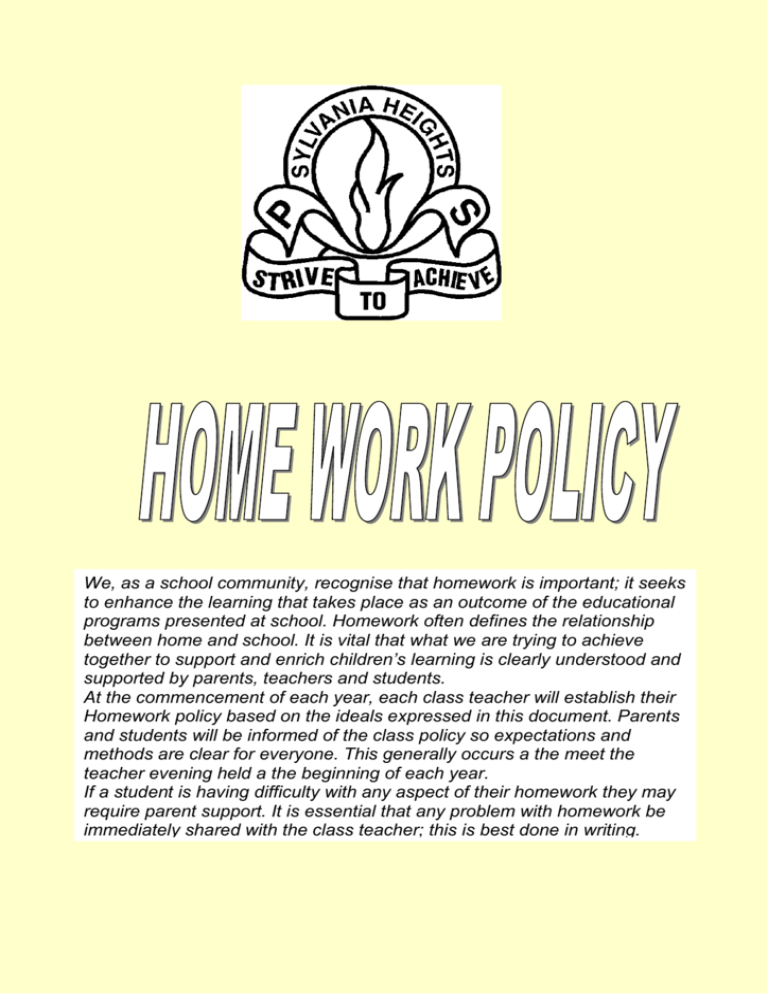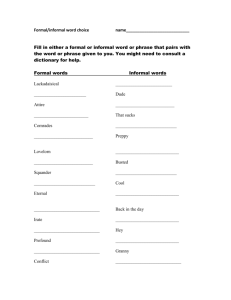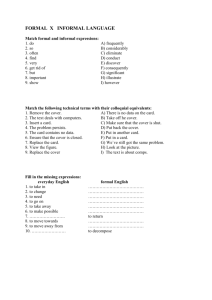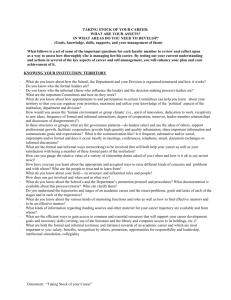BELIEF STATEMENTS ABOUT HOMEWORK
advertisement

We, as a school community, recognise that homework is important; it seeks to enhance the learning that takes place as an outcome of the educational programs presented at school. Homework often defines the relationship between home and school. It is vital that what we are trying to achieve together to support and enrich children’s learning is clearly understood and supported by parents, teachers and students. At the commencement of each year, each class teacher will establish their Homework policy based on the ideals expressed in this document. Parents and students will be informed of the class policy so expectations and methods are clear for everyone. This generally occurs a the meet the teacher evening held a the beginning of each year. If a student is having difficulty with any aspect of their homework they may require parent support. It is essential that any problem with homework be immediately shared with the class teacher; this is best done in writing. SYLVANIA HEIGHTS PUBLIC SCHOOL BELIEF STATEMENTS ABOUT HOMEWORK We believe that homework should reinforce the learning in the classroom. It is important that homework should: be a time for positive interaction between family members. provide parents with knowledge of areas of study in the classroom. encourage the development of individual study skills. be challenging and stimulating whilst recognising that individuals learn at different rates. recognise that individual students may need different periods of time to complete set tasks be clearly understood by students and parents. This is dependent on good communication, the responsibility for this is shared between home and school. be a partnership between home and school; teacher, parent and child each have responsibilities be completed from Monday to Thursday. We recognise that many individuals and families have important commitments on weekends and after school Suggested duration for informal and informal homework activities. The following are to be used as a guide only. K – 1 Informal home work with no set daily time limit 2---20 minutes made up of a combination of formal and informal tasks 3----30 minutes made up of a combination of formal and informal tasks. 4 ---- 30 minutes made up of a combination of formal and informal tasks. 5 ----40 minutes made up of a combination of formal and informal tasks. 6 ----40 minutes made up of a combination of formal and informal tasks. Informal tasks such as shared reading with your child should be for a duration that is practical within each family situation. Reading with and to your child each night will contribute significantly not only to their skill in this area but also to a positive attitude to learning These times indicate the maximum time that needs to be devoted to homework each night. Project work may extend over many weeks; it should be able to be completed in the set period if the student devotes reasonable application each evening. Project work should not be left until the last moment. THE TEACHER’S ROLE IS TO: ensure that homework is relevant, meaningful and directed at the appropriate level for each child. provide positive feedback, encouragement and rewards through the regular marking and reviewing of set homework. communicate clearly with students and parents. provide interesting homework that builds upon already established skills, knowledge and understandings. establish a class/grade policy on homework that is clearly understood by all parents and students. THE PARENT’S ROLE IS TO: provide positive and constructive feedback to the child through the demonstration of a genuine interest in their child’s endeavours. promptly communicate any concerns or questions, to the teacher, regarding any matters that relate to homework. 2 SYLVANIA HEIGHTS PUBLIC SCHOOL supervise, reward, encourage and advise. establish routines and locations that will assist children to complete all set tasks to the best of their ability. THE STUDENT’S ROLE IS TO: complete all home work to the best of their ability fulfilling the directions given by the class teacher. develop good home work habits and routines. confidently ask for help or clarification from their teacher or parent if they are unsure of homework content or directions. take pride in their efforts and develop an understanding that their full commitment is essential if they are to reinforce essential skills and knowledge. We believe that the following are suitable formal activities. practice and consolidation, e.g. mathematics worksheets, spelling activities written work, e.g. worksheets, text writing, reading that requires a response research work design and make activities We believe that the following are suitable informal activities. reading and being read to for enjoyment observation and discussion using the home environment bringing from home drawing, singing, playing discussing social contracts/grids WE BELIEVE THAT ACTIVITIES ARE NOT SUITABLE FOR HOMEWORK IF THEY INVOLVE: work not covered in class tasks that are not appropriate to an individual’s ability level materials not readily available at home or involve any excessive expense. 3 SYLVANIA HEIGHTS PUBLIC SCHOOL HOW BEST CAN PARENTS HELP? Helping means supervising and encouraging, especially as children learn the teacher’s routine or adjust to new tasks. As you know, most children respond positively to adult attention - your child is likely to benefit from having you give some time for interaction during a homework session. Some hints Provide praise for your child when they start the day’s homework with minimal fuss, or without being asked. Be nearby as your child is working, getting on with your own life, but on the alert for requests for help. ‘Visit’ your child every now and then to show your interest, without interfering. Encourage your child to show you the completed homework, and try to give positive but honest feedback. How can I help my child learn independence? You can encourage children to take some responsibility for their own learning by asking them each day to do these things for themselves: locate the homework in school bag or at home locate their box or basket of homework materials read the teacher’s instructions as to what needs to be done and when decide in which order they will do the day’s (or week’s) tasks try to work out for themselves what parts they can do independently, and which might need some help from you return completed homework to their bag on collection days. What if my child is experiencing some difficulty? Don’t take over. Give clues and hints, even the occasional answer, but don’t make the homework yours. This is counterproductive - your child’s self esteem and sense of being a learner will suffer. Instead: help a dependent child by working alongside them, modeling the routine, praising their perseverance or independent attempts try to show how to go about a task, e.g. show how to use the guide words in a dictionary rather than finding the word for the child have patience and act as though together you’ll work the problem through try to help the child ‘unpack’ the problem, that is work with them rather than doing the task for them, asking appropriate questions at various stages jointly attempt tasks which sometimes seem beyond the child, e.g. composing paragraphs, writing a book report find opportunities to praise, e.g. for improvement in tackling tasks, working more independently or quickly don't get critical or emotionally-involved to the point that you act unjustly and say things you don’t mean. If you need to assist during homework sessions continually over a period of weeks, it may mean the work is too difficult. Inform the teacher and ask for some guidance. What if my child sometimes becomes upset during homework? First rule out tiredness and other upsets, such as a falling out with friends at school, or just a bad day. Your child could be upset because the work is too difficult. This can happen if the homework is not related to work currently being done in the classroom. Remember it is not your role to have to teach what the child has not been taught in class. If possible, see your child’s teacher or write them a note, explaining the situation. This policy was reviewed in 2010 following an extensive staff and community survey. It is to be reviewed in 2014 4





